No one left behind??
It would be easy for me to tell you how homophobia, biphobia and transphobia are horrible and how I have experienced them, I can also tell you all the negative effects of the same so that I can urge you to stop. And you would be reading a blog post similar to a million others that you may have interacted with online. However, I want to do this a bit differently.
Being a CIS woman has what a friend of mine calls “privilege” and don’t get me wrong, I have had my fair share of struggles as an adult human navigating life in this country just like the next person. Before we even look at my gender. There is nothing simple about being a woman, from the harmful societal expectations placed on us to unequal opportunities not just in our homes but also in healthcare service provision, education, labour market, and policy-making to mention but a few. I however would not be true to myself to say that I can come close to comparing myself to the struggles a transwoman may undergo to get the same services. I could easily pass off as a heterosexual woman any day and I have done so for the past 25 years of my life.
So why am I here? the past 3 years that I have been out and proud have been slightly different and that difference is the reason you are reading this article now.
 Today is International Day Against Homophobia, Biphobia, Intersexphobia and Transphobia (IDAHOBIT). It is marked on 17 May each year because, on this day in 1990, the World Health Organisation (WHO) removed homosexuality from the International Classification of Diseases. As much as it is a day against violence and oppression, it is also a day for freedom, diversity and acceptance.
Today is International Day Against Homophobia, Biphobia, Intersexphobia and Transphobia (IDAHOBIT). It is marked on 17 May each year because, on this day in 1990, the World Health Organisation (WHO) removed homosexuality from the International Classification of Diseases. As much as it is a day against violence and oppression, it is also a day for freedom, diversity and acceptance.
In many cases, I would be typing about why it is important, why it started and some of the things you can do or will be doing to mark this day but bear with me again this is a big day. IDAHOBIT is like a birthday for us as a community, a queer birthday of sorts with us cutting cakes, having discussions, hosting and attending events to mark the day. When it’s over we wait for June, then the next day designated to “allow us to exist”. My point here is in many ways we have not been able to live freely and enjoy the basic human rights accorded to all humans. We wait for such days to have these conversations all the while we remain silent in our homes, in our relationships, in our workplaces, in our schools where we constantly experience homophobia, biphobia and transphobia and at times in an effort to fit in we tolerate being treated as less.
This year’s theme for IDAHOBIT is no one gets left behind and that includes you. Yes. You!
NO ONE LEFT BEHIND: EQUALITY, FREEDOM AND JUSTICE FOR ALL
But what do we mean by left behind? Are we in a marathon, a race or something?
For us at Women Working with Women no one gets left behind means that in our efforts to ensure justice for all we take the time to understand what inequalities look like for our community. As we implement our queering safe abortion project, we look at the intense health disparities that queer persons face in accessing reproductive health services, we look at how exclusions are reproduced in abortion interventions and programming. We have peer-to-peer conversations and sit-downs and discuss the challenges, burst the myths or misconceptions and find solutions. We have value clarification and attitude transformation workshops with service providers from the health, legal and policy-making arenas. With the help of SAAF, we have reached many LBQT persons with not just information but also referrals to help where needed.

What equality, justice and freedom for all means for us is that despite our constitution being so loud and stating that we all have the right to the highest attainable standard of health-
Health here being described as Mental and physical, Psychological, Social and Familial Wellbeing according to article 43 (a), while article 26 (IV) restricts access to abortion with the penal code emphasizing further on the legalities around abortion in Cap. 63 Articles 158-160, 228 and 240 hence fear by medical practitioners to offer safe abortion services. Sad right? Imagine the effects of abortion stigma as a stand-alone issue and now merge it with the stigma and discrimination that LGBTQ+ persons face daily. It’s unbearable!
We only dream of a day where safe abortion will not be a decision to be decided at the courts but by an individual with full autonomy to plan their future.
That choices regarding our bodies will be ours and only ours to make. When this happens, we will not only have less stigma around abortions but also support systems and safe spaces where LBQT persons can talk about their abortion stories. Shame dies when stories are told in safe spaces.
What no one gets left behind means: The next time we have a survey with our policymakers and health care providers and throw in a statement like men can get pregnant too the responses will read strongly agree from all present because that will show a 100% shift in attitude and what that means is that I as a bisexual woman in Kenya won’t have to act or fake heterosexuality in order to access these services, this in the long run will improve my general health-seeking behaviour and even further causing a ripple effect to my friends and the broader community.
What no one gets left behind means for us is also as simple as my friend who identifies as trans walks into a healthcare facility, a police station, a school, a bar or a restaurant and does not receive weird glances or demeaning remarks about their looks or worse get denied services because of their sexual orientation and gender identity and that when they need a safe abortion, they can access it without resorting to unsafe methods that put their life at risk.
This year’s theme means that in as much as the Universal Declaration of Human Rights says “All human beings are born free and equal in dignity and rights”. This is a promise that is yet to be fulfilled for LGBTQI+ persons and everyone else experiencing the multifaceted impacts of inequality.
So, this IDAHOBIT we would like to ask you:
What does “no one left” behind mean to you?
By Joy Wanga, Communications and Advocacy for Women Working with Women (3W)



